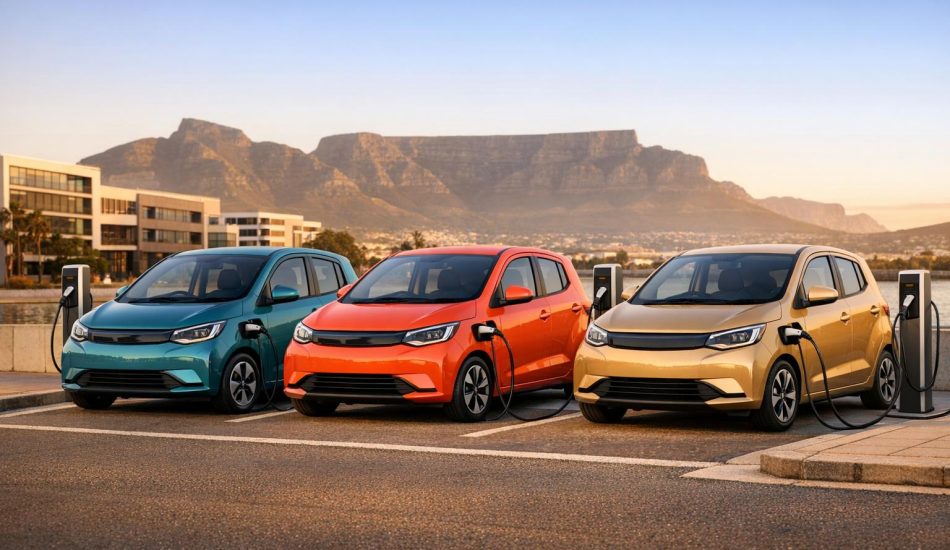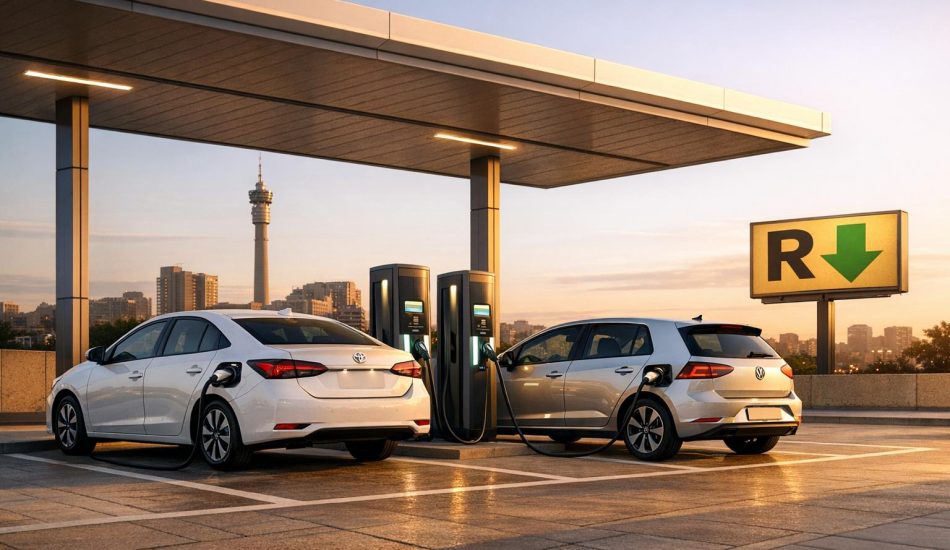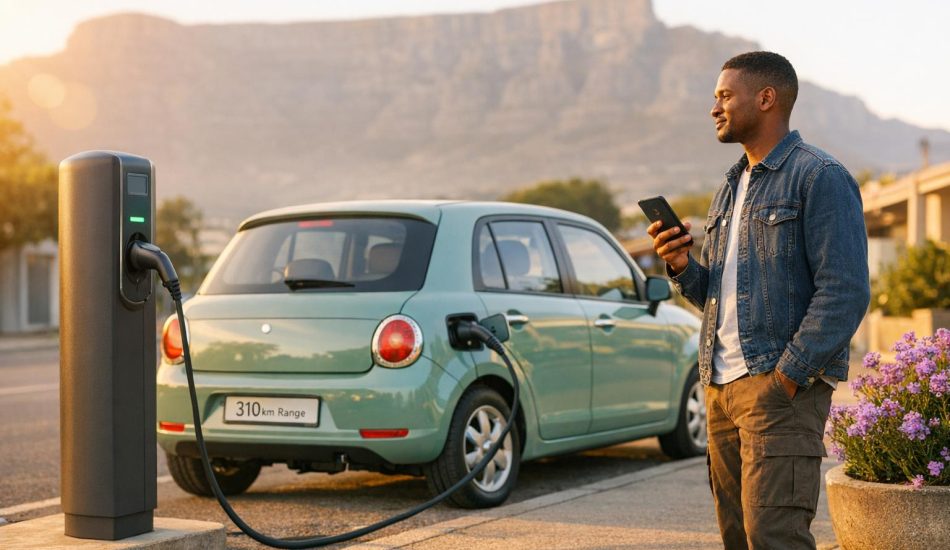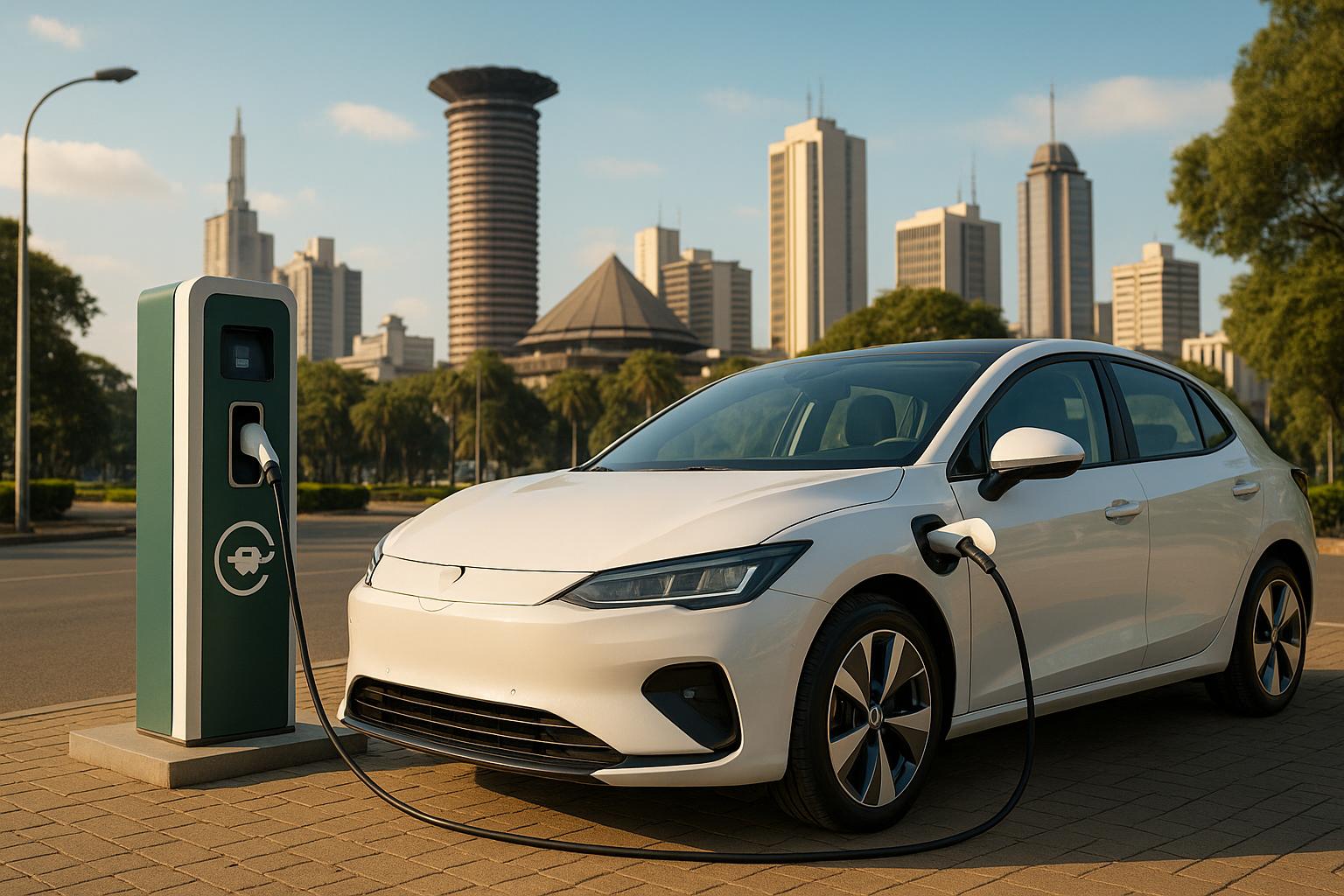
Kenya’s electric vehicle (EV) market is growing fast in 2025. Here’s what you need to know:
- 9,047 EVs are registered in Kenya as of May 2025, with sales increasing by 150% compared to 2024.
- Electric motorcycles dominate, accounting for nearly 90% of EV registrations.
- Charging stations have expanded from 67 in 2023 to over 200 in 2025, with plans for 10,000 by 2030.
- Top EV models in Kenya include: Nissan Leaf (KES 1.2M–1.7M), BYD Dolphin (KES 2.5M–2.8M), Hyundai Kona Electric (KES 3.5M–4.2M), and MG ZS EV (KES 2.9M–3.5M).
- Government incentives like reduced import duties (10%) and tax exemptions make EVs more affordable.
- Lower running costs: Charging is 30–50% cheaper than fuel, and Kenya’s renewable energy grid ensures sustainable charging.
How to Buy: Platforms like EV24.africa simplify the process, handling imports, financing, and delivery within 4–8 weeks. Buyers can choose between door-to-door or port-to-port delivery.
Key Considerations:
- Match the car’s range (200–450 km) with your driving needs.
- Install a home charger for convenience.
- Financing options and leasing plans are available for easier ownership.
Kenya’s EV market is transforming transportation with affordable options, growing infrastructure, and government support. Ready to make the switch?
How practical is having an electric car in Kenya?
Electric Car Models Available in Kenya for 2025
Kenya’s electric vehicle market is expanding, offering a variety of options to suit different budgets and lifestyles. From affordable city cars to spacious family SUVs, the lineup includes both globally recognized brands and locally tailored models designed for Kenyan roads.
Top Electric Car Models in Kenya
The Nissan Leaf is a popular choice for city drivers and ride-hailing services like Uber and Bolt. With a price range of KSh 1.2–1.7 million (2014–2017 models), it offers a range of 150–200 km, making it perfect for short commutes.
For families or those who travel longer distances, the MG ZS EV is a solid option. Priced at KSh 2.9–3.5 million (2021–2023 models), it delivers up to 320 km per charge and provides ample interior and cargo space, ideal for weekend getaways.
BYD has gained traction with models like the Dolphin, ATTO 3, and Seal. The BYD Dolphin, priced at KSh 2.5–2.8 million, stands out with its 300–400 km range and cutting-edge battery technology, appealing to modern drivers.
The Renault Zoe, a compact city car, is available for KSh 1.8–2.2 million (2015–2019 models). With a range of 250–300 km, it’s well-suited for navigating Kenya’s urban areas.
The Hyundai Kona Electric offers a premium experience with a range of up to 450 km. It supports fast charging, reaching 80% in just one hour, and is priced between KSh 3.5–4.2 million.
For those seeking cutting-edge design and advanced features, the Kia EV6 has been updated for 2025. It now includes a refreshed design, improved interiors, and compatibility with the North American Charging Standard (NACS). Prices range from $42,900 to $63,800, reflecting its premium import status.
Locally, Mobius Motors caters to the African market with the Mobius II, priced at KSh 1.3–1.6 million. Built for durability, it’s designed to handle Kenya’s unique road conditions.
Kenya’s EV market has also proven its adaptability in extreme conditions. In May 2025, EV Explorers, a team of Kenyan engineers, participated in the Rhino Charge off-road race with a custom-built electric vehicle, Car No. 29. Featuring four-wheel drive and two 480 kg batteries with 150-kWh capacity, it showcased the potential of EVs in challenging terrains. The Rhino Charge has raised over $18.56 million (KES 2.4 billion) since its inception, funding 780 kilometers of fencing to protect communities from human-wildlife conflict.
Model Features and Specifications Comparison
To help you choose, here’s a quick comparison of the top models:
| Model | Price Range (KSh) | Range per Charge | Charging Time | Best For |
|---|---|---|---|---|
| Nissan Leaf | 1.2M – 1.7M | 150–200 km | 6–8 hours | City commuters, ride-hailing |
| MG ZS EV | 2.9M – 3.5M | Up to 320 km | 7 hours | Families, long-distance travel |
| BYD Dolphin | 2.5M – 2.8M | 300–400 km | 7 hours | Modern professionals |
| Renault Zoe | 1.8M – 2.2M | 250–300 km | 6–9 hours | Urban eco-conscious drivers |
| Hyundai Kona Electric | 3.5M – 4.2M | Up to 450 km | Fast: 1 hour, Standard: 6–7 hours | Highway drivers, premium features |
How to Choose the Right Electric Car
When deciding on an electric vehicle, it’s important to match the car’s features with your daily needs and budget.
- Budget: If you’re looking for an affordable option, the Nissan Leaf is a great starting point. For those willing to invest more, the Hyundai Kona Electric offers longer range and faster charging.
- Daily Driving Needs: For city commutes of 50–100 km, the Nissan Leaf or Renault Zoe are practical choices. Longer trips may require the MG ZS EV or Hyundai Kona Electric.
- Charging Infrastructure: In cities like Nairobi and Mombasa, charging stations are more accessible. In areas with fewer stations, models with extended range, like the BYD Dolphin or Hyundai Kona Electric, may be more practical.
- Family Size: If you need extra space, the MG ZS EV is a better fit for larger families or those with significant cargo needs.
- Technology Preferences: For advanced connectivity, consider the BYD Dolphin or Kia EV6. If simplicity is your priority, the Nissan Leaf or Renault Zoe are reliable options.
Regardless of the model, installing a home charging system can improve your ownership experience. Wall-box chargers make overnight charging convenient, and pairing them with solar panels can cut costs further. To extend battery life, avoid letting the charge drop below 10% regularly.
Electric Car Prices in Kenya for 2025
If you’re planning to buy an electric vehicle (EV) in Kenya, understanding the pricing landscape is key to making informed decisions. The market offers a variety of options, from budget-friendly city cars to high-end SUVs. Prices are influenced by factors like government policies, import regulations, and additional costs such as shipping and dealer markups. Let’s dive into the price ranges and what affects EV costs in Kenya.
Price Ranges for Electric Car Models
Electric car prices in Kenya depend on the model, age, and condition of the vehicle. The Kenya Revenue Authority publishes Current Retail Selling Price (CRSP) values, which serve as a baseline for taxation. However, final prices also include import duties, shipping fees, and dealer markups.
Used imports, particularly from Japan, are the most affordable EV options. Here’s a breakdown of some budget-friendly models based on CRSP values:
| Rank | Make & Model | Body Type | CRSP (KES) | USD Equivalent* |
|---|---|---|---|---|
| 1 | Toyota C+ Walk T | Hatchback | 544,402 | ~$4,200 |
| 2 | Toyota C+ Walk T (Z variant) | Hatchback | 578,216 | ~$4,450 |
| 3 | Toyota C+ Walk S | Hatchback | 776,180 | ~$6,000 |
| 4 | Dongfeng EX1 Nano | SUV | 1,583,128 | ~$12,200 |
| 5 | Dongfeng Nammi 01 | Hatchback | 2,005,296 | ~$15,450 |
*USD conversions are approximate for reference.
For more established models with advanced features, prices are higher. For instance, the BMW iX3 SUV typically costs between KES 10–12 million for used or imported units. Compact models like the Ora Good Cat range from KES 2.5–4 million.
What Affects Electric Car Prices in Kenya
Several factors shape the final cost of owning an electric car in Kenya. Government policies aimed at promoting EV adoption have reduced taxes compared to traditional fuel-powered vehicles. For example, while conventional cars face import duties of up to 35%, EVs benefit from a reduced 10% import duty and are exempt from excise duty and the standard 16% VAT.
Here’s an example of how taxes and fees might add up for a KES 700,000 EV:
- Import duty (10%): KES 70,000
- Import Declaration Fee (3.5%): KES 24,500
- Railway Development Levy (2%): KES 14,000
Additional costs include registration fees (KES 10,000–20,000), annual insurance (KES 30,000–50,000), and clearing agent fees (KES 60,000–80,000).
The age and condition of the vehicle also play a role. Most affordable EVs in Kenya are grey imports – used cars from Japan – while newer models with cutting-edge features command higher prices. These factors highlight the need for financing options to make EV ownership more manageable.
Financing Options for Electric Car Buyers
To ease the financial burden of owning an EV, various financing solutions are now available in Kenya. These programs address challenges like high upfront costs and limited credit access. For example:
- OpenCharge Kenya offers loans with interest rates as low as 1.25% per month.
- MOGO Financing Kenya provides options for both vehicle purchases and logbook loans.
In June 2025, GreenMax Capital Group and MojaEV Africa launched a pilot program aimed at taxi drivers. This initiative allows drivers to lease Neta EVs without the usual 20% upfront payment, supported by a $150,000 subordinated loan from GreenMax.
"This pilot is not just about cars – it’s about building pathways for inclusive finance, local bank engagement, and climate-smart livelihoods." – Clifford Aron, President of GreenMax
The program spreads the down payment across lease payments. After six months of consistent repayment, MojaEV transfers the leases to local banks. Lease-to-own options are also growing in popularity, offering lower monthly payments with eventual ownership. These plans often include perks like vehicle servicing and access to charging networks, ensuring a smoother ownership experience.
When considering financing, think about your monthly income, driving needs, and long-term financial goals. Most providers require documentation such as proof of income and identification, so be prepared to meet these requirements.
sbb-itb-99e19e3
How to Buy and Get Your Electric Car Delivered
Buying an electric car on EV24.africa is straightforward. Browse the available listings, pick your ideal model, arrange financing if needed, and place your order. From there, EV24.africa takes care of the import process, customs clearance, and delivery.
Steps to Buy an Electric Car on EV24.africa
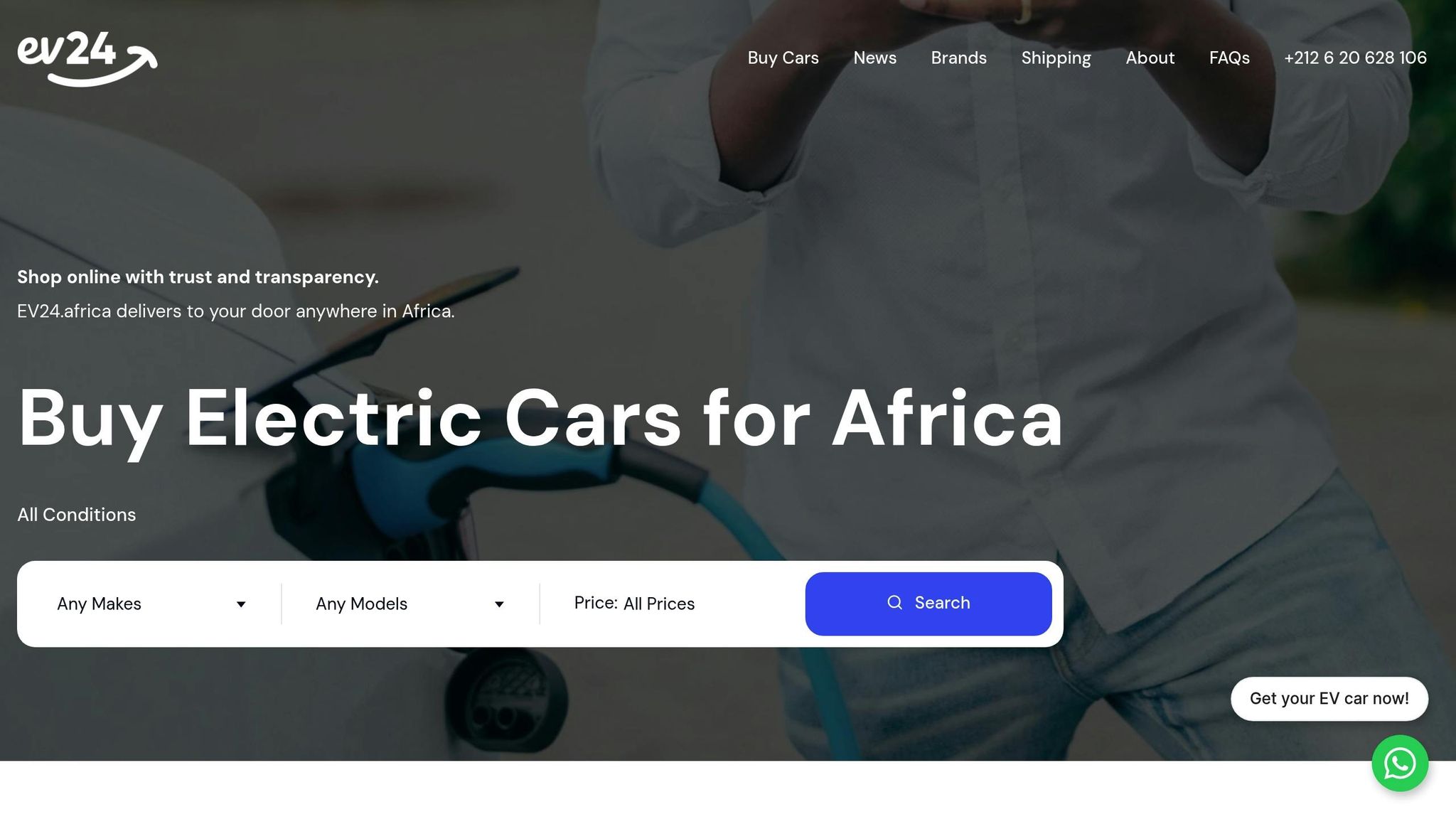
Start by exploring the wide range of electric vehicles on the platform. EV24.africa features new and used models from top brands like Tesla, BYD, Leapmotor, ROX, Dongfeng, Geely, Hyundai, Toyota, and Suzuki. Each listing includes detailed specifications and pricing, helping you make a well-informed choice.
Use the comparison tools to evaluate models and pricing. If you require financing, EV24.africa partners with reliable financial institutions to provide flexible payment plans. Once you’ve finalized your selection and completed the payment process, EV24.africa handles the import and delivery logistics.
Delivery Options Across Kenya
After completing your purchase, EV24.africa ensures a smooth delivery experience across Kenya. Deliveries are available in major cities such as Nairobi, Mombasa, and Kisumu. You can choose between door-to-door or port-to-port delivery options. For most imports, the Port of Mombasa serves as the main entry point, with EV24.africa managing all customs and import procedures according to international trade standards (Incoterms). Shipping options include both RoRo (roll-on/roll-off) and container shipping.
Support and Services After Purchase
Once your electric car arrives, you’ll have access to a range of after-sales services. These include dedicated customer support, warranties for key components like batteries and motors, and access to spare parts. EV24.africa’s expert team is equipped to assist you, whether you’re in an urban area or a more remote location. This ensures you can maintain and enjoy your electric vehicle with confidence.
Owning an Electric Car in Kenya: What You Need to Know
Owning an electric vehicle (EV) in Kenya involves more than just picking the right car and financing plan. To make the most of it, you’ll need to understand the charging infrastructure, battery care, and general maintenance.
Charging Stations and Infrastructure in Kenya
Kenya’s EV charging network has grown rapidly, with over 100 operational stations across the country as of July 2024. Kenya Power has ambitious plans to expand this network, focusing on high-speed and standard charging stations in six counties: Nairobi, Nyeri, Kisumu, Eldoret, Nakuru, Mombasa, and Taita Taveta.
In July 2025, a Chinese e-mobility company introduced Kenya’s first 80kW DC fast charging station in Nairobi, with a goal of establishing 100 more stations by year-end. These fast chargers can power an EV to full capacity in just 15 to 30 minutes. The Kenyan government has set a bold target of deploying 10,000 charging stations by 2030, with Kenya Power committing up to $1.9 million over the next three years to support this effort. Dr. Joseph Siror, Managing Director and CEO of Kenya Power, emphasized this commitment:
"Kenya Power is committed to enable the country’s transition to electric mobility to catalyse the reduction of carbon emissions. Part of our plan is to create an enabling environment for players within the e-mobility ecosystem through provision of adequate power supply and the requisite infrastructure such as charging stations that will enable motorists to travel with ease."
Charging costs depend on the type of station. Level 2 chargers typically cost between $2,200 and $11,000 to install, while DC fast chargers can exceed $37,000. For drivers, charging is 30–50% cheaper than fueling a traditional car. Infrastructure improvements are also supported by projects like the Usahihi Nairobi–Mombasa Expressway, which includes EV charging points along the route.
As the charging network expands, proper battery care becomes crucial for long-term EV use.
Battery Life and Maintenance Tips
EV batteries generally last 8 to 10 years, but how you charge them can significantly affect their lifespan. For everyday use, keep the battery charge between 20% and 80%, charging to 100% only for long trips. Avoid letting the charge drop below 10%, and limit the use of DC fast chargers to long-distance travel.
Kenya’s warm climate adds another layer of consideration. Parking in shaded areas helps prevent heat stress on the battery, and regular diagnostics ensure the thermal management system is functioning properly.
Routine maintenance is key. Perform monthly software updates, check coolant levels, inspect tires, and review electrical systems. EVs have instant torque and are heavier than traditional cars, so rotate tires every 6,200 miles and maintain proper inflation. Schedule professional inspections annually or every 12,400 miles to examine high-voltage systems, charging ports, and suspension components. Keeping detailed maintenance records is essential for warranty coverage.
Balancing these care routines with the benefits of EV ownership can make the experience worthwhile.
Pros and Cons of Electric Car Ownership
| Advantages | Disadvantages |
|---|---|
| Lower operating costs: Charging is 30–50% cheaper than fuel | Higher upfront costs: EVs range from $22,000 to $44,000, more than double the price of many fuel-powered cars |
| Environmental benefits: Over 75% of Kenya’s electricity comes from renewable sources | Limited rural charging: Charging stations are scarce outside major cities, leading to range anxiety |
| Emissions reduction: Contributes to Kenya’s goal of cutting greenhouse gas emissions by 32% by 2030 | Lack of local expertise: Few specialists are available for EV repairs |
| Policy incentives: Tax breaks and subsidies for buyers | Awareness challenges: Many consumers lack knowledge about EV benefits |
| Reduced maintenance needs: EVs require less routine servicing | |
| Instant torque: Provides better acceleration and driving performance | |
| Energy independence: Reduces reliance on imported fossil fuels |
Kenya’s EV market is growing fast. Sales jumped by 108% between the 2022 and 2023 financial years, and by the end of 2023, the country had registered 3,753 EVs – a fivefold increase from 2022. Electric motorcycles dominate the market, making up nearly 90% of registered EVs.
While challenges remain, Kenya’s reliable, renewable energy grid offers a strong foundation for EV adoption. The government is actively supporting this transition through policies, and a thriving e-mobility startup scene is helping to drive innovation.
Getting Started with Electric Cars in Kenya
Kenya’s electric vehicle (EV) market is evolving at a fast pace, opening up exciting possibilities for those ready to make the switch to electric mobility. This guide highlights key benefits and practical steps to help you transition smoothly.
Key Points to Know
Government incentives make EVs more affordable. Kenya offers 0% excise duty, reduced import duty, and lower VAT on electric vehicles. These tax breaks help offset the higher upfront costs, making EV ownership more accessible.
Charging infrastructure is growing, with a target of 10,000 stations by 2030. Kenya’s grid is powered by 90% renewable energy, making EVs a greener choice. Charging costs are also budget-friendly, averaging KSh17 ($0.13) per unit compared to KSh27 ($0.21) for domestic electricity users .
Choose a model with a range of 200–350 km for city driving. Right-hand drive EVs are the best fit for Kenyan roads .
Modern EV batteries are built to last. They typically offer a lifespan of 150,000–300,000 km, supported by advanced battery management systems to maintain performance.
Lower running costs make EVs a smart long-term investment. While a Dolphin hatchback costs about 13 million KES compared to 4 million KES for a standard 1300cc petrol car, EVs save money by eliminating expenses like oil changes, fuel filters, and exhaust system repairs .
With these essentials in mind, here’s how you can start your journey toward owning an electric vehicle.
Steps to Start Your EV Journey
Begin your search with EV24.africa for a hassle-free buying experience.
- Evaluate your lifestyle and commuting needs. Consider your daily routes and charging options to find the right EV model.
- Compare models and prices on EV24.africa. Look for options that suit Kenyan road conditions and your budget.
- Check battery health for used EVs. Request detailed reports and verify the vehicle’s specifications, mileage, and history .
- Plan your charging routine. Identify charging stations near your most frequently traveled routes.
- Explore financing options and reliable suppliers. EV24.africa can help with import logistics, including pre-shipment certifications and customs clearance .
Kenya’s push for electric mobility is backed by strong government policies, expanding infrastructure, and increasing consumer interest. With affordable charging costs and a renewable energy-powered grid, EVs offer a practical and environmentally friendly choice for forward-thinking buyers.
FAQs
What government incentives are available for electric vehicle buyers in Kenya, and how do they reduce costs?
The Kenyan government has introduced several measures to make electric vehicles (EVs) more affordable for its citizens. These include tax exemptions, deductions, and grants designed to encourage the adoption of EVs. Additionally, policies that promote local EV assembly and manufacturing aim to bring down costs even further for potential buyers.
Starting in 2025, buyers can take advantage of federal tax credits, which offer up to $7,500 for new EVs and $4,000 for used ones. These incentives, paired with the lower operating costs of EVs, help make ownership more budget-friendly and accessible to a wider audience in Kenya.
How does the growth of charging stations in Kenya affect the convenience of owning an electric car?
The push to establish a robust charging infrastructure in Kenya, aiming for 10,000 stations by 2030, is transforming electric vehicles (EVs) into a more practical option. With more charging points popping up, particularly in key urban areas like Nairobi and Mombasa, drivers can worry less about range anxiety – the fear of running out of charge without a station nearby.
As charging becomes easier to access, making the switch to EVs feels less daunting for everyday drivers. This expanding network not only boosts the adoption of electric vehicles but also builds trust in the shift toward cleaner, more sustainable transportation.
What should I consider when choosing an electric car in Kenya to fit my needs and budget?
When choosing an electric car in Kenya, it’s important to weigh a few key aspects like driving range, charging availability, and overall expenses. Start by ensuring the car’s range matches your daily travel requirements, whether it’s for commuting or longer trips. Also, confirm that there are convenient charging stations in your area to avoid any hassles.
Think about the total cost of ownership too – this includes the upfront price, ongoing maintenance, and any savings you might gain from lower fuel costs or tax breaks. By carefully considering these elements, you can pick an electric car that fits your needs, your budget, and lets you enjoy the perks of switching to electric driving.


